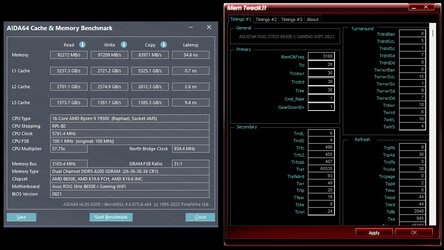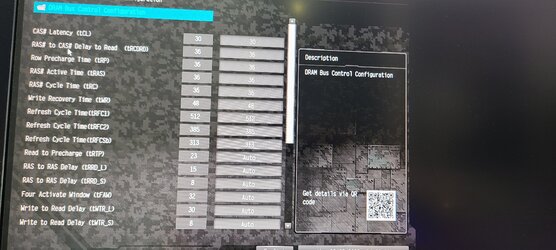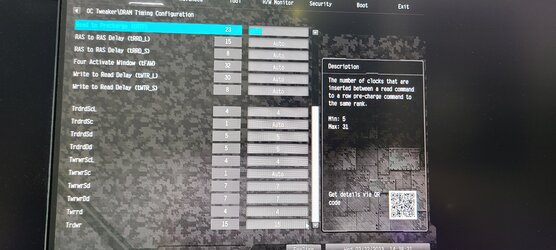- Joined
- Feb 9, 2002
So I have been fiddling with 6000-MHZ timings for a bit ASROCK does not always share the same naming scheme as other brands.
But it should be ok to follow , I don't see many others showing their timings but these are at my current the best configuration i have found for 6000-Mhz "30 CAS" timings.
I am using Kingston KF560C36BBEAK2-32 (FURY Beast 32GB DDR5 RGB 6000MHz CL36 AMD EXPO Certified Dual Channel Kit (2 x 16GB), Black)
Nothing super impressive with these DDR5 SK Hynix Memory sticks I can imagine most sticks doing the same lower grade or higher.
I should State right now I think these can be improved on by someone more experienced.
I will link 2 Pictures with my Bios timings listed because this is an ASROCK motherboard I'm not 100% that all the configuration names are exactly the same.
These sub timings improved my FPS by at-least 10FPS just by changing them.
And I've seen in some reviews such as the Gigabyte motherboards they are setting some of these timings automatically while the others are not .. the memory modules should accept them however.
And I have been running the modules at 1.4v instead of 1.35 for good measure.
It would be nice if this is a thread we can build off of , its been a while since we had one.
If anyone has any more recommendations then just add to this thread I will try to keep it somewhat updated.
But it should be ok to follow , I don't see many others showing their timings but these are at my current the best configuration i have found for 6000-Mhz "30 CAS" timings.
I am using Kingston KF560C36BBEAK2-32 (FURY Beast 32GB DDR5 RGB 6000MHz CL36 AMD EXPO Certified Dual Channel Kit (2 x 16GB), Black)
Nothing super impressive with these DDR5 SK Hynix Memory sticks I can imagine most sticks doing the same lower grade or higher.
I should State right now I think these can be improved on by someone more experienced.
I will link 2 Pictures with my Bios timings listed because this is an ASROCK motherboard I'm not 100% that all the configuration names are exactly the same.
These sub timings improved my FPS by at-least 10FPS just by changing them.
And I've seen in some reviews such as the Gigabyte motherboards they are setting some of these timings automatically while the others are not .. the memory modules should accept them however.
And I have been running the modules at 1.4v instead of 1.35 for good measure.
It would be nice if this is a thread we can build off of , its been a while since we had one.
If anyone has any more recommendations then just add to this thread I will try to keep it somewhat updated.
![20230114_175541[1].jpg](/forums/data/attachments/360/360533-561aab1af85d3e4f3b3b3bc95fd62388.jpg)
![20230114_175530[1].jpg](/forums/data/attachments/360/360534-26ad7974f8ff666464c3de02b0fc8979.jpg)


